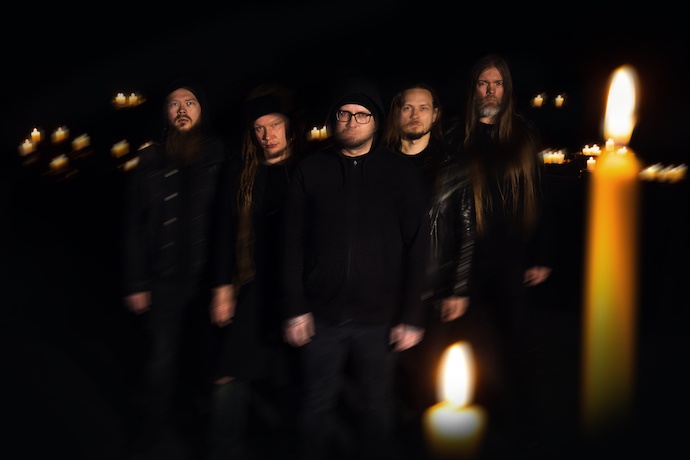
(Today we present Comrade Aleks‘ interview of Markus Laakso from the Finnish band Kuolemanlaakso (among other endeavors he’s involved in, which are also discussed below). The band’s newest album Kuusumu was released this past spring by Svart Records.)
Kuolemanlaakso (“death valley” in Finnish) once was known as the “death-doom band with Swallow the Sun’s vocalist”. It was started in 2010 and the band’s line-up didn’t change since then: Mikko Johannes Kotamäki (vocals), Markus Laakso (guitars, keyboards, vocals), Toni Ronkainen (drums), Tuomo Räisänen (bass), and Petteri Ruotsalainen (guitars).
Their first album Uljas uusi maailma (2012) was already too progressive and melodic for any rigid “death-doom” tag. The EP Musta aurinko nousee (2013) and the LP Tulijoutsen (2014) developed Kuolemanlaakso’s eclectic style only further until Markus recorded M. Laakso – Vol. 1: The Gothic Tapes (2016), something like his own gothic Kuolemanlaakso-based spin-off…
Besides that, Markus Laasko is the author of two metal books which we need to mention in this interview, which is focused on the band’s fourth album Kuusumu.
******
Hi Markus! How are you doing? Kuolemanlaakso’s (still new) album Kuusumu was released five months ago, so what’s your plan now?
I’m doing pretty well, thanks. I’ve been very busy with a number of different projects, some of which are seeing the light of day soon, including the debut album of my dream pop project Her Shadow and the English translation of my Amorphis book. As for Kuolemanlaakso, we did some shows to promote Kuusumu, and now we’re preparing our next steps.
Dream pop project? I was sure that only Sami Hynninen could combine his interests towards doom and electro music. How did it happen that you switched on this kind of music?
My musical taste and interest is wide, so it makes a lot of sense for me to experiment outside metal. Her Shadow’s debut album The Ghost Love Chronicles has been in the works for five years, and it’s finally coming out. You can imagine the joy to finally be able to let everyone hear it.
I started the project with an old friend of mine, guitarist Tomi Henttunen, in 2016. We didn’t have any prior experience in making this sort of stuff, which made it even more fascinating. Everything fell into place swiftly, and Tomi wrote a lot of killer stuff. My role is much smaller; I concentrated on the lyrics and arrangements. The idea was to combine the best bits of the world of Twin Peaks with Lana Del Rey, but there’s definitely some Morricone, Amy Winehouse, and Motown sounds in there, too. It’s an interesting combination. Check out the first single “Fifth Season” from YouTube and streaming services.
Kuolemanlaakso’s previous album M. Laakso – Vol. 1: the Gothic Tapes was released six years ago. What’s the reason for such a long break? And why didn’t you return with Vol.2?
The Gothic Tapes was my solo album, even though it was sort of released under the Kuolemanlaakso name. It is not considered a Kuolemanlaakso album by the band, nor me and thus it’s not on our website. A lot of people have been wishing for Vol. 2, but I don’t know if I’ll make it or not. It was a side project, like the KISS solo albums of 1978.
If we put the Gothic Tapes aside then there’s an eight-year gap between your previous album Tulijoutsen and the new Kuusumu. How far did you move from the point where you were in 2014?
The long gap was mainly my fault. I was too busy with other work, and was dealing with some personal issues. The motivation just wasn’t there and the timing wasn’t right. But once we got the ball rolling in 2020, the music started flowing very naturally. In fact, in my personal opinion Kuusumu is by far our best album on all grounds.
I think the long break made our music mature. We paid way more attention to the arrangements than ever before, and there are no weak moments on the record. If we had made the album in, say, 2016, it would have been completely different. Thus, the break helped us grow artistically to another level.
We were actually planning to record an album way back in 2015, and had tons of material for it, but the only piece of music that made it to this album was the beginning riff of “Surusta meri suolainen”. We might revisit the scrapped songs some day. It was decent stuff.
Does it mean that you see now the weak sides of Tulijoutsen clearly? Can you name any?
Well, yes and no. I think Tulijoutsen is still a great album, but if we were in the studio working on it right now, I’m sure we’d do a lot of things differently.
Some of the arrangements could be tighter, some tempos are too fast or too slow, and not all the songs are as good as others. The production and performances are great, though. There are parts that could have been edited out, but we did the absolute best with what we had. It’s a stamp of its time for the band, and a perfect one at that.
And what helped you to compose a more mature album this time? Is it your experience in listening to other bands? Or did you just need more time for this?
I think it’s a combination of maturing as a human being and a musician, and analyzing the “faults” of our previous albums. The latter part made us raise the bar higher and work even closer on the arrangements and minor details that constituted superior results. Some might not like this album as much as the previous ones, but I personally consider it our best work.
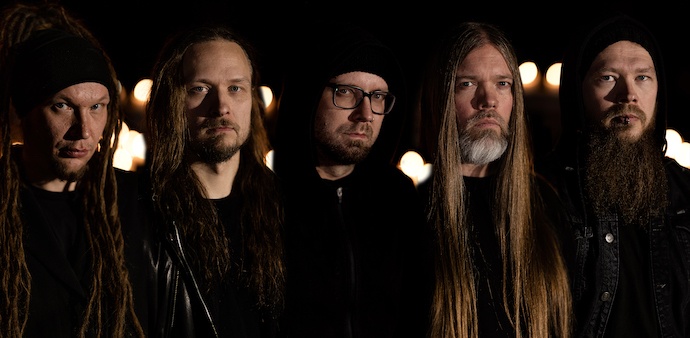
There are five personalities in the band, and each of you has a different background. Is it easy for you to find a balance in the studio? How do you reach it?
I think it works out quite nicely as everyone has a particular role in the studio. This time Tiera (drums) and I spent a lot of time on drum pre-production, so it was easy for him to nail everything on hard disc, as he knew exactly what to play. Kouta (guitar) always participates in the drum recordings, as he has a lot of ideas and is a very rhythmic dude. He plays most of the rhythm guitars on our albums, and I play whatever’s left. I also record vocal demos during the demo phase for Kotamäki (vocals), as I write the lyrics and simultaneously hear the arrangements in my head.
Usva (bass) is a very melodic bassist, and comes up with the most amazing bass lines. This time Santura and Usva recorded the bass parts together with no one else present. The last phase was to work on the keyboard arrangements with Aleksi Munter (ex- Swallow the Sun). I sent him my ideas, and he took them to the next level. It was awesome to work with him, as he’s a good friend of ours, a super-cool dude, and one of the best keyboard arrangers out there.
Did Victor Bullok throw you some ideas as well? I see that he performed some lead guitars parts and percussion for some tracks.
He always comes up with great ideas, and this session was not an exception. However, on this album the compositions were much more finished than before and we had a super-tight schedule for recording, which left less room for creativity.
Victor has played some parts on all our releases, and we’re glad to have him guest starring, as he’s a far greater guitarist and percussionist than any of us, haha… He loves to play the tambourine, and he’s really proud of his skills on the instrument – as he should be, he’s awesome!
This time you used for your artwork The Light Shineth in Darkness and the Darkness Comprehended it Not by Evelyn De Morgan. Does it fit the album’s general lyrical theme that well?
Once I found the artwork, I knew it was the way to go. Kuusumu translates to “moon fog”. The album deals with the effects of the dramatic global cooling that started in 535. It caused mass death, drought, famine and all sorts of other horrible things. It lead to the bubonic plague that wiped out a huge percentage of the European population.
In my mind the artwork represents the fog that started it all, as well as descending to another spiritual dimension. The fog, meaning volcanic ash, veiled the sun and made it lose its light and warmth for 18 months. There are many things that I find curiously symbolic in the artwork. Still, I prefer that people make up their own interpretations of the cover than reveal more about my own thoughts and rob them of the joy to think for themselves.
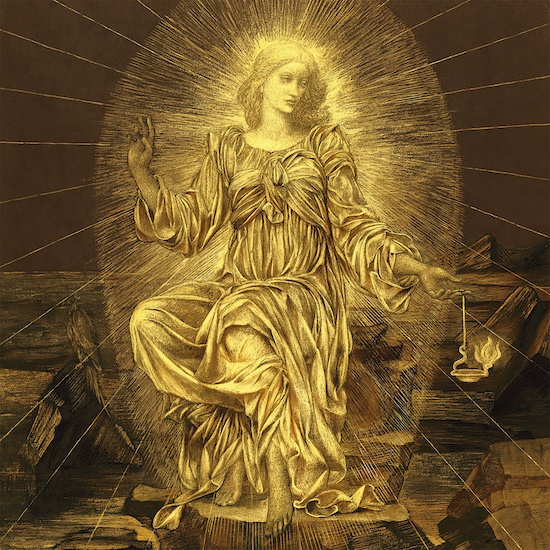
So it’s in the album’s title – “the moon fog”, right? How optimistic are you regarding the ecological situation in your country or in the world in general? We can sort out the garbage in our cities, but you can’t do anything with good old snow-white corporations, which pollute Africa, Eastern countries, and so on, with tons of our shit.
I’m the wrong person to be preaching anything, but I’m very concerned about the future. Metal bands have been singing about the apocalypse and the end of the world since day one, but we are living in such a dystopia right now. There’s a pandemic wiping us out, a genocide going on in Ukraine, the energy crisis is forcing people to cut down on the heating of their homes, and the mental health of the whole population of the world has decreased dramatically during the social media times.
That’s on top of global warming, overpopulation and the sixth mass extinction, caused by the greed of our twisted species. Mind you, these are just examples of the mess that we’re in and have caused.
In times like these it’s impossible to remain optimistic. I donate money every month to Luonnonperintösäätiö (https://luonnonperintosaatio.fi/), which buys and protects primeval forests in Finland. Preserving nature is the best investment I’ve ever made. Trees are the lungs of the world. Why destroy them? I love Brazil, but burning down the Amazon rainforests is pretty much the worst act anyone can do for the planet and its entire species. As long as the leaders choose financial growth over preserving life and habitable environment, we are doomed. Do you see a change coming to this in the near future? Didn’t think so.
How would you sum up your message on Kuusumu?
Everything’s cyclical. We are not the lords of nature, no matter how much we kill and enslave it to meet our endless greed. Nature will always prevail. I find it comforting.
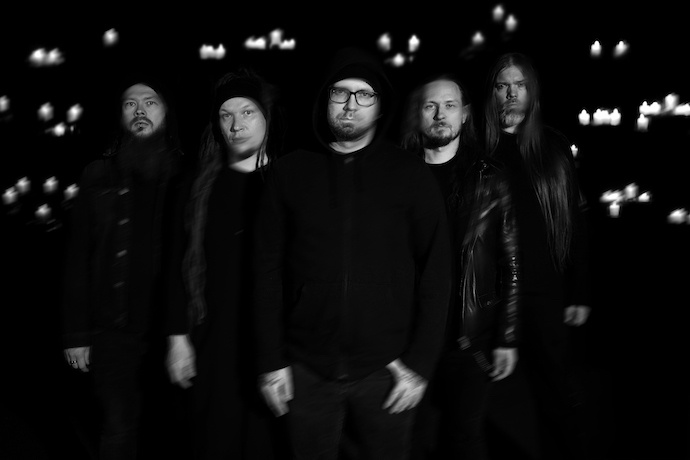
Do you plan to play live gigs now when you have the new album on your hands?
We were supposed to do a full European tour and do way more shows in Finland, but Covid and other obstacles got in the way. We’re planning a little something for March, but let’s see how it goes. The live business is still in a crisis right now, and it affects us, too.
Once your music was classified as “death-doom” even though you moved further from it from the very beginning. How much of death-doom is left in Kuolemanlaakso? Does belonging to a certain genre play a role for you?
I’m not a big fan of labeling bands to tight boxes. If bands feel that they can’t do this or that artistically, it makes it hard for them to evolve.
We definitely had more death-doom elements in the past, but it makes the ultra-heavy parts stand out more if there’s other stuff going on an album, too. For example, it doesn’t get more death-doom than the c-part of “Surun sinfonia”.
I honestly don’t know what our music should be called according to the unwritten rules of defining genres.
I’ve seen that your Amorphis biography was finally translated in English! That’s the good news. How did it came to this? It took some time, didn’t it?
It feels awesome to have it finally being released in English, as the demand and amount of messages that I’ve received about it has been INSANE! It took so long because of contractual hold-ups, but fortunately it’s all good now, much thanks to Jouni Markkanen, the manager of Amorphis, and Tomi Pulkki from Svart Records, the publisher of the English version. The band is also very happy about the release.
Originally Amorphis’ biography was published in Finnish in 2016. Did you update some chapters for the English edition?
The book was actually released in 2015, and the German translation in 2016. I didn’t update the chapters nor did I write new ones. I simply didn’t have the time nor interest to do so. Let’s see what the future brings. The book came out on Amorphis’ 25th anniversary year. A 50th anniversary second volume would be cool, haha…
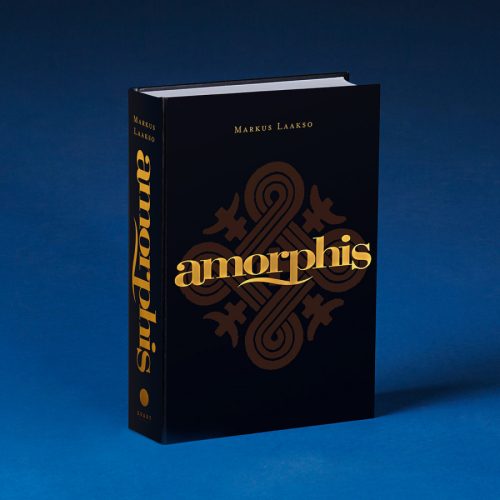
I read the Sentenced biography released by Svart in English in 2021, and well… they told it themselves… it’s fantastic how they spoiled all their chances to move the band further and spread their charm, their influences. How did Amorphis overcome all the obstacles on their way?
Well, it’s all in the book, heh… To sum it up: by persistence, friendship, ambition, and sheer musical talent. There are no dickheads in the band; they’re all easy-going guys who share a passion to thrive in their art.
Time passes by and paper books turn into artifacts for nerds and most of the die-hard fans. Do you plan to start another book? Do you believe that the physical format will survive?
I’m optimistic that the physical books will survive, even though audio books are a huge trend now. I don’t have a new book in the works at the moment, but never say never. I have been asked to write a novel, and that’s actually something that I’d love to do at some point. Right now it’s impossible for me to commit to such a gigantic project, as the Amorphis translation hits the streets this month, Her Shadow’s debut is in November, a release that I can’t reveal yet is in December, and the Folk Metal Big 5 translation next year. Right now I’m working on a new musical project called The Ghoulstars, which has a show and album recording coming up. That’s on top of my day job and family duties.
Wait! The Ghoulstars? Is it something influenced by Warhammer 40k?
When I came up with the name, I googled “Ghoulstars”, and came across Warhammer 40k. I’m not a gamer, so it was news to me that such a thing exists in the Warhammer universe.
If I were to define The Ghoulstars’ music, I’d say it’s somewhat a combination of Misfits, White Zombie and Venom. Horror punk meets groovy tunes and extreme metal. I’m actually waiting for the singer to arrive right now, as we’re going to record some demo vocals.
And yes, my next question was about the Folk Metal Big 5, but you’ve said it. Will it be released by Svart too?
Yeah, Svart’s going to release it. It has been translated already, but the translation requires a lot of revamping. It’s a tough book to translate, because there’s so much history, mythology and cultural references in it.
How do you see the band’s prospects now? Will you keep it alive or do you need some time to promote Kuusumu?
We’re working on a little surprise for ya…
Well, surprise means surprise! I don’t want to pull it out from you! Thank you for the interview Markus, it’s great to get all this good news from your side. I hope that we’ll have a reason for another interview soon.
Thank you for the interest and support! Cheers to all the readers who made it this far.
https://www.facebook.com/kuolemanlaakso
https://kuolemanlaakso.bandcamp.com/
